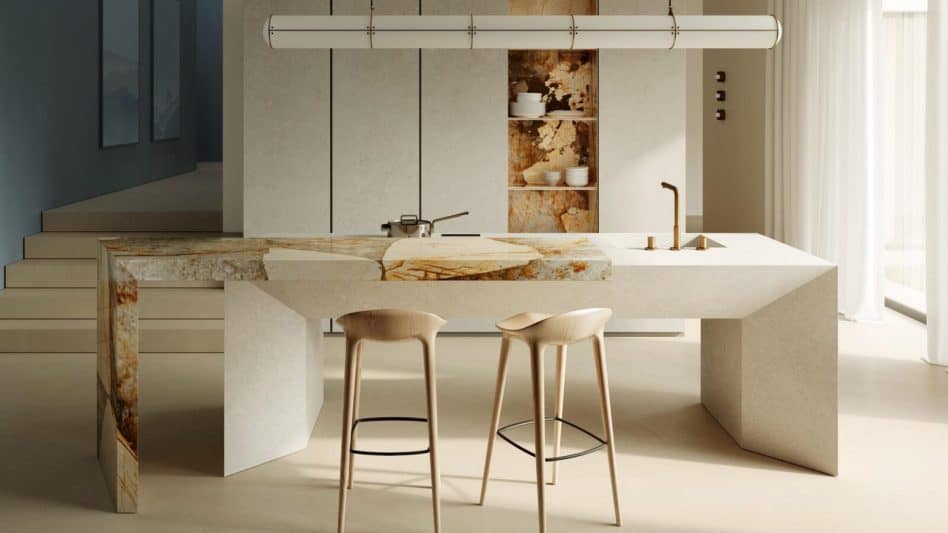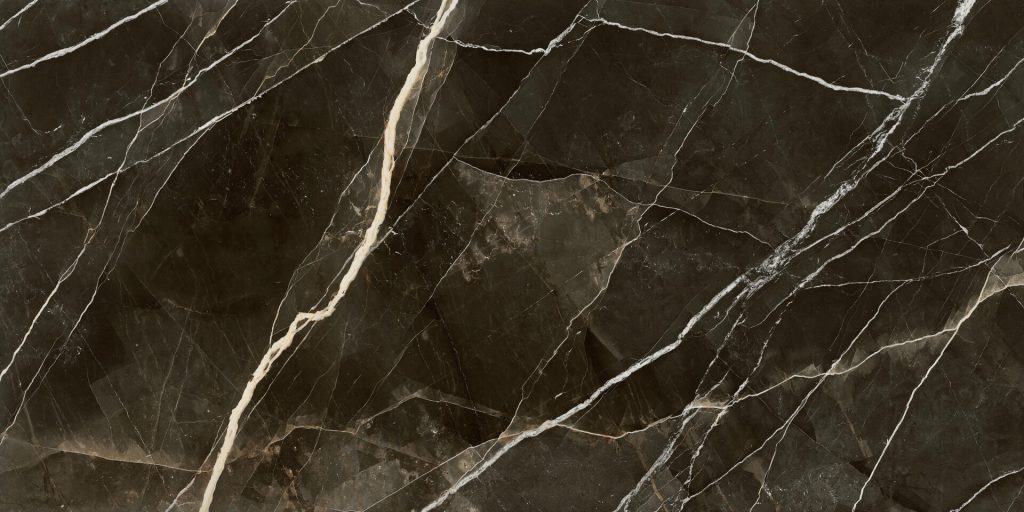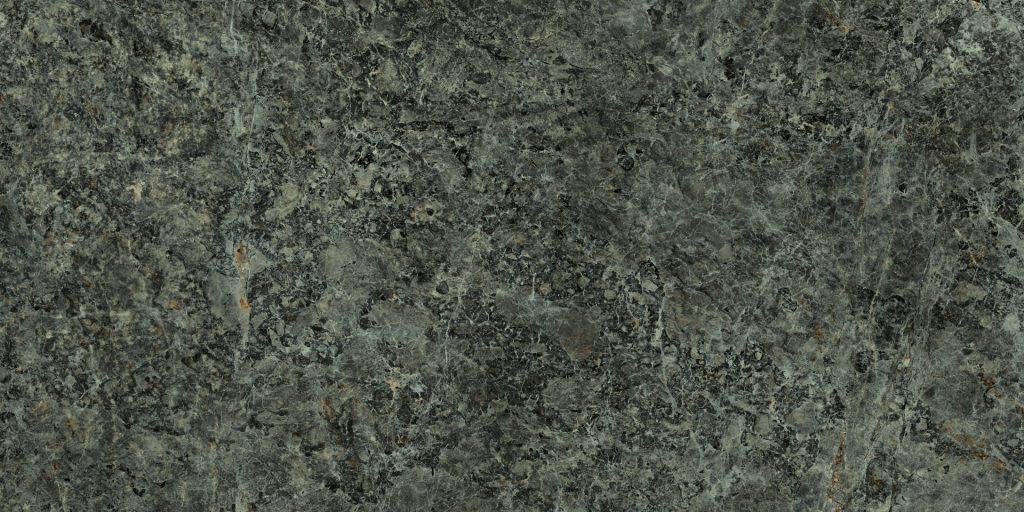
Silica, a key component in engineered stone, has been banned in Australia due to its link with a debilitating lung disease known as silicosis. The government has announced that the ban will take effect from July 1, 2024, citing the need to protect workers from the risks of silicosis. With suppliers already discontinuing their engineered product lines, homeowners and renovators will need to seek out alternative materials for their kitchen benchtops in 2024.
With this in mind, we’ve put together 5 common alternatives and explore what each material is and the features they offer.
PORCELAIN

Calacatta Black Glazed porcelain, 12mm satin finish, made in Italy
Porcelain is a premium material recognised for its superb durability and strength, low maintenance, and diverse range of colour and design options. Made from raw materials like feldspar, refined clays, and other minerals, compacted together under high pressure and fired at temperatures ~1,300 degrees celsius, porcelain is remarkably hard-wearing and durable. Even at just 12mm thick it is resistant to heat, moisture, frost, scratches, impact, stains, and etching, making it perfectly suited to all kitchen demands. Advanced manufacturing technologies realistically replicate the colour and patterns found in natural stone without the maintenance requirements needed to prolong and maintain natural stone’s look and integrity. Porcelain slabs can be bookmatched and are typically manufactured with limited prints. This allows you to have greater predictability of the finished installed look compared to natural stone where no two slabs are alike.
Pros:
Scratch, stain, frost, and etch-resistant – Hygienic, very low maintenance, and easy to clean – Excellent heat tolerance, fireproof – Colour fast and UV resistant – Premium look and feel – Non porous/Sealing not required – Variety of colour and design options – Consistency of colour and designs – Relatively lightweight compared to natural stones and concrete – Made from raw materials
Cons:
Digit print glazing only applied to surface, not 12mm exposed edge – Requires professional fabrication and installation
NATURAL STONES
Natural stones each possess their own unique beauty, aesthetic characteristics, and value to the home. Most natural stones have varying degrees of porosity and aversion to acidic cleaning substances so care should be taken to maintain your investment. Expect higher range in cost as premium materials. The harder the stone the more forgiving it will be to maintain.
GRANITE

Granito Black is used to give this bathroom a refined and sophisticated feel. Glazed porcelain, 12mm satin finish, made in Italy
There’s good reason granite is strongly associated with benchtops. It’s a hardwearing and forgiving stone that can hold up against the demands of any kitchen environment. Often recognised for its chunky texture, you may know popular varieties such as Star Galaxy, Nero Absoluto, and Ice White. Used for centuries in various forms in architecture and interior design, this popular stone has certainly stood the test of time. The finishing process reduces the stone’s porosity, however, you’ll still want to seal granite as with all natural stones. This protects it from stains, moisture, and bacteria that can make its way into the stone. You’ll also want to avoid harsh chemicals or abrasives which can damage the seal.
Pros:
Hygienic – Strong, highly durable, and long lasting – Good heat and scratch resistance – Less attention required compared to marble and limestone
Cons:
Porous – Ongoing maintenance/Sealing required – Acidic cleaners cause etching – Limited variety of colours and patterns – Requires professional fabrication and installation
LIMESTONE

Limestone Sand adds seamless warmth and soft stony textures to this earthy space. Glazed porcelain, 12mm satin, made in Italy
Limestone offers an understated yet luxurious feel to any kitchen. The earthy hues effortlessly complement neutral colour schemes and its softer stone textures create a relaxed feel. Limestone is versatile in contemporary, traditional, and in-between home styles. Textural appearance can vary but is generally even toned. It’s important to consider that limestone is considered a soft natural stone and can be easily damaged through staining, discolouration, etching, and scratches, if not adequately maintained or sealed.
Pros:
Stylish and high-end appeal – Earthy tones and soft textures – Adds value to your home
Cons:
Not heat proof – Can scratch, stain, and scuff easily – Porous and requires sealing – Acidic cleaners cause etching – Limited colours options – Only stone appropriate or pH balanced cleansers should be used – Professional installation and fabrication required
QUARTZITE

Quarzo Bluegrey realistically emulates the intricate patterns found in quartzite. Glazed porcelain, 12mm satin finish, made in Italy
Quartzite boasts a dazzling array of veining patterns and colours, offering a one-of-a-kind look for every kitchen. As a metamorphic rock, quartzite is highly resistant to heat and scratches making it a low-maintenance option. While still porous, different varieties of quartzite have lower porosity than others. This natural stone complements a variety of design styles, including modern, transitional, and contemporary. Quartzite benchtops should not be confused with engineered Quartz which is man-made of crushed quartz, resins, pigments, and binders. Quartzite is made up of only minerals that give it its dynamic colour and patterns.
Pros:
Highly durable and resistant to scratches, stains, and heat – Unique and beautiful natural veining patterns – Luxurious appearance that elevates the look of your kitchen – Relatively low maintenance – UV resistant
Cons:
Requires professional installation – Limited variety of colours – Bolder patterns not for everyone
MARBLE

Capraia makes this kitchen exquisite and captivating. Glazed porcelain, 12mm gloss finish, made in Italy
Marble transforms any surface into an exquisite delight, which comes as little surprise behind its historical and architectural significance, and continued popularity for high-end homes. Classic white marble is pure calcite, without minerals to give it its characteristic veins. Pink and golden marble is tinted with iron oxide. Serpentine, rich in magnesium, gives green and deep red marble its grandeur. For benchtop purposes, marble’s biggest drawback apart from its high cost as a soft natural stone is the maintenance and upkeep required to look its best. Even common acids found in food and beverages can damage its appearance due to etching (dissolving) the stone. Seal regularly to prolong its longevity.
Pros:
Very attractive – High end appeal – Thermally inert/Stays cool – Excellent heat tolerance – Longlasting with proper care – Natural material
Cons:
Porous – Sealing required – Susceptible to stains, scratches, and etching – Requires care and specialised cleaning products – Can crack due to fallen heavy objects – Limited colour options – Requires professional fabrication and installation
STAINLESS STEEL
An essential material for commercial kitchens has become popular in residential designs because of its utilitarian, minimal, practical, and hygienic qualities. Kitchens that use stainless steel look sleek and functional and will give homeowners peace of mind knowing stainless steel can high pressure demands. Keep in mind it’s easy to scratch and dent, and reconsider if a stainless benchtop is right for you if the sight of fingerprints and oil smears bother you. For an ultra-modern or industrial look, pair it with concrete-look tiles. For a more balanced approach, mix with wood-look tiles or stone.
Pros:
Highly durable – Long lasting – Easy to clean – Non porous – Hygienic – Sealing not required – Recyclable – Scratches can be buffed out
Cons:
Scratches and dents easily – Smudges and fingerprints are noticeable – Industrial/Commercial look is not for everyone – Limited design/colour options – Heat conductor
CONCRETE

Concrete White effortlessly complements this kitchen’s modern and sleek aesthetic. Glazed porcelain, 12mm matte finish, made in Italy
Popular with industrial and modern aesthetics, concrete benchtops offer a one-of-a-kind, durable, and highly customisable benchtop solution. Its the customisation that really separates concrete benchtops apart as different types of aggregate and dyes can be combined and mixed to create a distinctive texture, colour, and appearance. Skilled professionals pour the concrete on-site and it can be moulded into various shapes. Thermal shock can cause cracks however these can be repaired. You’ll also want to seal concrete benchtops to protect from stains, moisture damage, and UV damage. Most importantly, consider the extra support and bracing required to support the heavy weight of concrete.
Pros:
Repairable – Strong and durable – Distinctive and customisable – Patina adds character and history
Cons:
Porous – Sealing required – Prone to cracking, stains, and scratches – Very heavy/Requires extra support and bracing – Professional installation required – Industrial look isn’t for everyone – Susceptible to UV damage without sealing
WOOD

Rovere Francese introduces warmth and softness to offset the grey chairs and floors. Glazed porcelain, 12mm, satin finish, made in Italy
Crafted from solid slabs or milled planks, benchtops made from wood create a warm and cosy atmosphere. They can be used to add a touch of softness or contrast with other harder surfaces, bringing the outdoors into your home. With proper care, timber can age gracefully, developing a beautiful patina over time. You may recognise popular choices including Oak, Walnut, Beech, Tasmanian Oak or Blackbutt. Knowing the upkeep required to keep it looking its best, wood benchtops are a top pick for those seeking a natural look that is durable enough for the demands of a kitchen.
Pros:
Natural material – Durable and long-lasting with proper care – Adds warmth and nature to the home – Patina adds character and history – Repairs are possible – Possible to DIY install
Cons:
Vulnerable to water and moisture damage- Can scorch or burn – Smells and residues can embed into the material – Scratches and dents easily – Re oiling required to keep it looking its best – Harbours mould if not properly maintained – Limited colour options
In summary when deciding on a benchtop, aside from your budget constraints, here are five key points that should be considered with any decision to choose a benchtop:
Features & benefits: While many options have overlapping features and benefits, they can significantly differ in terms of durability, maintenance, and overall suitability for your specific needs.
Maintenance vs. durability: Investing in a benchtop that requires less maintenance with greater durability can save you time, money, and effort in the long-run despite incurring a higher upfront cost.
Factors affecting cost: Supply and install costs, including fabrication costs, will vary between materials. Consider that more complex edge profiles, sink/stove integration designs, and thickness of the benchtop will all impact the end cost.
Kitchen cabinet design: You’ll want to consider your benchtop in tandem with the design of your kitchen cabinets (new or existing) and overall kitchen design for a harmonious kitchen appearance.
Supply & lead times: While suppliers stock certain items, it is common for suppliers to have long lead times anywhere from 3-6 months in some cases. Ensure you give yourself enough time when placing your order to avoid compromising on your preferred choice.
A benchtop is just one component to consider in good kitchen design. After exploring these options, it’s clear they all offer unique advantages and reasons for choosing their appeal. However, every homeowner’s situation is different each with their own unique values and needs. Use this to create your criteria to determine the benchtop most suitable for you. Porcelain, stainless steel, granite, and quartzite, offer the highest durability with lowest maintenance. Marble, limestone, and wood offer qualities unique only to natural stone and wood but come with the responsibility of attention and care to make it a worthwhile investment. If we can shamelessly plug our own porcelain slabs, which we think provides exceptional value without sacrificing quality or high-end appeal for the reasons described earlier, please feel free to get in touch at (08) 9377 3385 or visit our Balcatta showroom.
